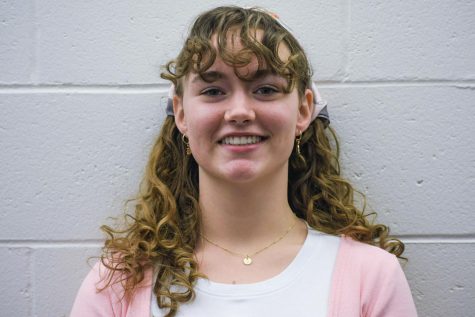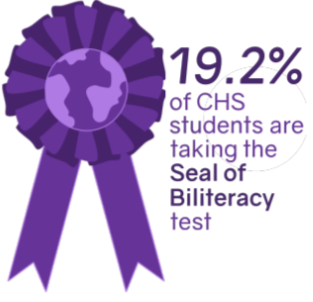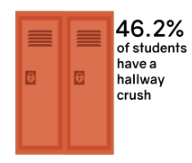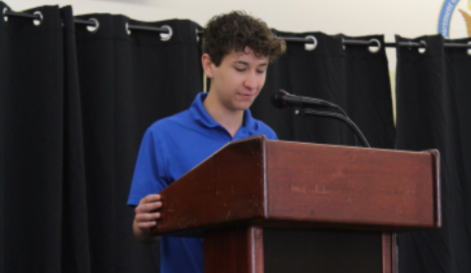CHS raises concerns about mental health resources

Blot graphic by Julia Perconti and Adriana Poznanski
According to a survey, 50% of teens with mental health conditions are treated.
January 17, 2020
New Jersey is one of only nine states that require mental health education by law. In August of 2019, New Jersey Governor Phil Murphy signed a bill that “required public school health education to include mental health,” according to NBC. This bill will take effect during the 2020-2021 school year.
This policy follows a new awareness at the government level of what the National Education Association (NEA) is calling a “mental health crisis” in youth around the country. According to Mental Health America, clinical depression in youth ages 12-17 has increased by 4.35 percent over the last six years.
While a movement for mental health education is on the rise, many schools, including CHS, fail to accommodate and address student needs.
“When I was struggling a lot with my mental health last year, they were not accommodating at all in helping me with making up any of the work that I missed or being lenient with absences,” an anonymous female junior said. “I think that they just weren’t used to somebody struggling with those things.”
When junior Erin Burke of Allentown missed a whole month of school during her freshman year for mental-health-related reasons, CHS was very accommodating in offering options to make up work. Though Burke believes in the school’s ability to handle student issues, she does not think that “there is enough initiative coming from the actual administration.”
A mental health resource offered by the school, the guidance department, often goes unused by students in need due to a lack of connection with the counselors themselves. Senior Serena Khan of Union Beach acknowledges that the guidance department’s doors are always open, but also recognizes this disconnect.
“Students will not always go… for help,” Khan said. “A solution I would propose is for the guidance counselors to set up appointments with students throughout the year… they should use these appointments to check up on the students and find out what’s going on in their lives to see if they need any support.”
Khan and other students hesitant about visiting the guidance counselors seek solace in the trusted adults they see daily: their teachers.
“The CHS faculty is the best when it comes to the students’ mental health issues,” Khan said. “A lot of teachers are more than willing to listen to the students’ problems and are always there to give you advice.”
“I enjoy the fact that students come to me,” Clark said. “But it also puts me in a bad position in different times, like if I say the wrong thing. It’s a double-edged sword. One of the reasons why I really left Allied was because I was really ill-equipped for some of the issues there.”
Biology and health teacher Leah Morgan agreed that teachers can be excellent confidants, but still refers students to guidance for the better help. Guidance Counselor Melanie Sambataro agreed with Morgan.
“While we would love for our students to come see us more, we are glad they feel comfortable going to an adult in the building,” Sambataro said. “We are confident that the teachers know when to keep us informed.”
According to the NEA, 70% of students with a mental health disorder do not receive adequate treatment. Sambataro recognizes options beyond the guidance department to fulfill student needs.
“We do receive training and actively seek out opportunities for it. However, these approaches are for use during the school day; we are school counselors but not licensed therapists. We will do a referral for outside counseling if needed,” Sambataro said.
Unbeknownst to most students, however, MCVSD is taking district-wide action to meet student mental health needs. Before the start of the 2019-2020 school year, the administration hired a district psychologist, Dr. Krista Johnson. As a school psychologist, Johnson’s responsibilities include overseeing and providing counseling, interventions, support groups, mental health education and further treatment recommendations for students and families.
“The district has recognized the rise of mental illness in adolescents and the need to provide all district students with additional mental health support,” Johnson said.
Junior Hayden Minard of Union Beach is working directly with Johnson to bring mental health awareness to CHS specifically as a member of the Society for the Prevention of Teen Suicide (SPTS). Minard attends monthly meetings that discuss topics like mental wellness, suicide prevention and student help resources. The organization hopes students bring awareness and support back to their high schools.
“Ms. Johnson spoke with me after the initial event about some ideas I had about how to bring the message back [to CHS],” Minard said. “I am working directly with the guidance office to hopefully get something going.”
“The message I would like students to take home is that it is okay to not be okay, and reach out for help,” Johnson said.














